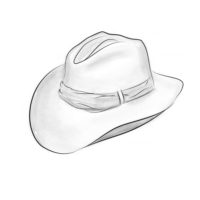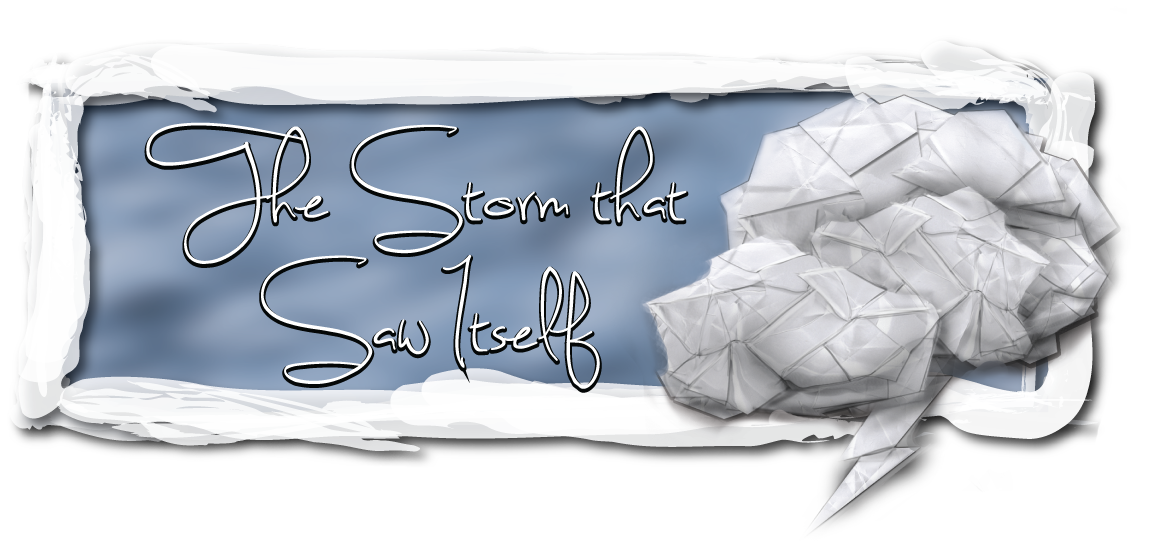– 4 –

Mr. Gulley sits by the phone in an empty house.
Somewhere in the halls upstairs from him his cat Inedible clanks by.
He used to have servants.
He’s fired them.
He used to have a wolf. He still does have a wolf, really, but he doesn’t go near it. It’s too dangerous now. He just pours kibble and occasionally cuts of meat into the kibble chute.
He used to have a son.
He still does have a son, really, but —
For the past three weeks, Edmund has missed his weekly call. The nithrid, too. He barely even dares to hope that this time the phone will —
Only, it does.
It rings.
He seizes it up. His heart races. He says, “Edmund?”
“Dad.”
“Edmund,” says Mr. Gulley. His face twitches. “I hadn’t thought you’d call.”
“Dad.”
“I’d figured you’d snapped, son,” says Mr. Gulley. “What with the reports. Killing people. Eating people. That’s not really — the point of this, you know.”
Edmund is silent.
“What happened, Ed?”
“I figured it out, Dad,” says Edmund. “I know how to free the wolf. Can you tell it for me? I know how to let it go. I just have to eat enough people.”
“We don’t eat people,” says Mr. Gulley.
“I got hungry,” says Edmund.
“We all get hungry!” says Mr. Gulley. “We all get hungry. We’re Gulleys. But we don’t eat people. Not since your great-grandfather, and there was a war on. A war on!”
Edmund sighs.
“I’ve become an instrument,” says Edmund. “Refined. Perfected. A scalpel. And you can’t be a scalpel without breaking a few eggs.”
This is not a very good analogy.
“I mean,” he says, “You can’t be perfect if you don’t eat people. Sometimes.”
This is not a very good analogy.
“I’m sharp like my stomach,” Edmund flounders, like an awl.
“Son,” says Mr. Gulley, “I’m a little worried about you.”
“I only really ate the nithrid,” says Edmund.
“Really?”
“You’d heard more?”
“I’d heard a lot.”
“It’s exaggerated,” Edmund says. “Unless I’ve been sleep-snacking or something. Or, oh, maybe the Principal’s all ‘oh, hey, another white-hatted person ate somebody again, I bet it’s all Edmund’s fault.’ The man is biased, sir.”
“I see,” says Mr. Gulley, because he does.
“I do plan to eat people,” says Edmund. “It’s just — I’m having trouble.”
“That’s your upbringing,” says Mr. Gulley. “Stern as a Gulley! Hardly ever go into a cannibalistic frenzy, Gulleys. Pillars of the community and all that.”
“People keep standing in creepy circles around me,” Edmund says.
“Oh.”
“It’s really distracting!”
“I’d tell you to buck up and ignore them,” says Mr. Gulley. “Only, I won’t. Bullying is a serious problem and I’m afraid there’s nothing for you to do but take it like a man and be so totally distracted that you never eat people. That’s a right proper education, that.”
Edmund is laughing. He is holding the phone with both hands and he is hunched over so it is close to the hollow where was his heart and he is laughing.
“I want to eat Sid,” says Edmund.
“Sid?”
“He’s . . . just, he needs me, Dad.”
There’s just silence on the other end.
“Dad?”
“‘He?’”
“It’s not a . . . he’s got his clear hat,” says Edmund. “Like, mucous.”
“Can’t you — I mean —”
Mr. Gulley does not quite know how to express to his son that he’d be more comfortable if his son were planning to hunt down and eat a girl. After a moment he just harrumphs. “I hear you’re wearing a white hat,” he says. “Yourself. Some sort of Smurf, now, are you?”
“It’s not voluntary, Dad.”
“It’s not in the dress code, is what it isn’t. The Principal’s complained!”
“Really?”
“Well, after I told him that he won’t be bringing any charges against any Gulleys for murder and anthropophagy,” says Mr. Gulley. “On account of my owning his school, his residence, and, if absolutely necessary, his goolies.”
“He moved on to the hats.”
“Said they’re a gang thing,” says Mr. Gulley. “You should ditch ’em.”
“Well,” says Edmund, amusement wound through his voice like a wolf, “that’s not happening, since I’ve kind of glued mine on. You don’t want me to have to cut off all my hair, do you, Dad?”
Mr. Gulley stares at the phone for a while.
After a while, he says, “Sometimes it’s hard to remember that they’re people, son. When you get really hungry. But they are. You know?”
“They don’t look like it any more, Dad.”
“I know,” says Mr. Gulley. “But they are. They’ve got — thoughts, and feelings, and stuff. I understand, son, but — they do. They’re like us.”
“They’re not like us,” says Edmund.
“No?”
“They’ve never seen the wolf.”
And he’s not talking about the bigness of the wolf, or the wisdom in Fenris’ eyes; or the way that Fenris is going to eat both of them, if events proceed as planned. He’s talking about the only thing he can think about, which is the bonds around Fenris’ mouth and legs.
And in that moment, suddenly, Mr. Gulley is fiercely proud.
He’s thinking of the telly, which has been all over the living storm that’s been beating this way and that over England; and that’s his son, there, that freed it, that took the nithrid he could only drag up to Earth and had let it go. For a moment, he’ll forgive everything else, as worrying as the weather service makes that, because —
“Son —” starts Mr. Gulley.
But he doesn’t get to say it. Whatever it was that was going to come out of that pride of him, the words are lost; he doesn’t get to say them, and we’ll never get to hear.
“I think I’m going to slip, Dad,” Edmund is saying. “I think I’m going to slip. The others in my House, they’re not used to it, they’ve eaten more people, but I don’t think I’m that much better. I think I’m just barely ahead of the curve. I can’t control them. I don’t think I’m even going to be able to control myself. I’ll eat one more. Then two. Then four — pretty soon, I’ll eat the whole world, and then it’s on to space.”
“Don’t do it,” says Mr. Gulley. “I raised you better than that, son. Don’t.”
“Dad,” says Edmund. “You’ve got nothing to do with it.”
“. . . what?”
“I got a magic hat,” says Edmund. “I put it on and it explained everything to me. It told me, I could be the one to free everything. All the tangled masses in their horrors. I could let everything free. I could let them go. Maybe I could hit the prisons, Dad. I could hit the prisons, I could eat the walls. They’d run free, they’d be so happy, Dad. You know that prisons corrupt the prisoners and the guards and even the fabric of the country that has them. That’s why there aren’t any prisoners in Heaven.”
“Don’t do that, son. Don’t get caught doing that. Don’t —”
“Hats don’t lie about moral issues, Dad,” Edmund says.
“Don’t eat people, son.”
“They’re not people,” says Edmund. “They’re just . . .”
He doesn’t finish.
After a while, Mr. Gulley says, “I wish I’d had more time with you.”
“Dad.”
“The wolf’s going to eat me soon,” says Mr. Gulley. “I think. I don’t know how. I just . . . I’ve been . . . I’ve been away so long. If I go down and see him I know he’ll eat me. One snap. He won’t trust me to come back again. But how can I not go see him?”
“Wait, Dad,” says Edmund. “Wait. Hang on. Don’t let him. I want —”
Edmund makes a horrified strangled noise. He hangs up the phone. He hangs up the phone before he can tell his father how much he wants to eat him himself. How much he longs for that, to butcher his father and eat him up. How happy that would make him. How delicious it would be.
“I love you,” says Edmund, to a deadened line.
After a while Mr. Gulley fumbles the phone back onto the hook.
He goes to check on Edmund’s heart.
There’s a small altar in Edmund’s room. On it is a wooden box. In the wooden box is Edmund’s heart.
Mr. Gulley pats the box. It is sound. It is solid. He listens to Edmund’s heartbeat. There is nothing untoward.
“Damnable dwarf,” he mutters, even though, in the final analysis, there is very little in Mr. Gulley’s situation that is actually Joffun’s fault.
A wolf howls, lonely, in the basements far below him.
Somewhere in the halls upstairs from him his cat Inedible clanks ponderously back and forth.


